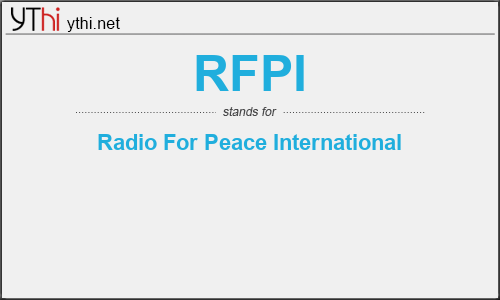What does RFPI mean? What is the full form of RFPI?
The Full Form of RFPI is Radio For Peace International.
Radio for Peace International or RFPI was a Media project started by James Latham, Debra Latham and Max Loffler who met in Oregon in 1985. The project was first suggested at a talk that James Latham gave in Portland, Oregon to a group of peace and human rights activists. The talk focused on a media approach to growing world crises by the creation of a world community radio station and network that would broadcast exclusively on the topics of peace and disarmament, human rights and the environment. In September of 1987 the project’s first station went on the air from the University for Peace in Costa Rica. The station transmitted on the shortwave broadcast bands crowded with other international broadcasters such as Voice of America, Radio Moscow, HCJB and others. The first few years were lean as the station struggled to get a usable signal out to the listeners. By 1994 the staff and transmitting power had grown and the station was in the process of building its own two story building to house its growing office and studios.
The following years saw the staff of RFPI producing considerable amount of programming and had brining on a number of independent radio shows. It was at this time that marked the entry of hate radio programmers using shortwave broadcasting. Many such programmers rallied around the Militia movement and purchased air time on U.S. licensed radio stations in the United States. Alarming to the staff of RFPI and feeling a response was needed James Latham and Brad Heavener created the Far Right Radio Review radio program on RFPI, a program that took a critical look at the hate radio producers broadcasting on powerful U.S. stations. On a weekly basis the Far Right Radio Review program exposed the connections of such racists programs with established hate groups. During this time the station came under constant threats. In June of 1995 the Costa Rican government stationed a team of OJA special forces at the radio station to protect the journalist and buildings. Three months after the government removed the heavily armed team James Latham was shot at by two armed and masked men while he was closing up the station.
In 1996 the station created the Institute for Progressive Communications which trained students in radio production and media activism. From 1996 to 2003 over 300 students attended the specialized training usually held in month long or year long courses. The media courses were tailored to those working in peace, human rights and the environment. Along the way journalist from RFPI covered live a number of world conferences and interviewed a wide range of people from the Dali Lama, John Denver, Lady Bird Johnson to people protesting on the street. The station also was innovative with Internet technology early on demonstrating to Amnesty International the use of web casting, and in 2001 establishing the first Internet to shortwave listener to listener tie in. The staff was totally involved with the tech side of the station and it was said RFPI might be one of the few stations in the world that the program director and station manager could miss the first few minutes hosting a show due to the fact they were climbing down a 200 foot tower after repairing a antenna.
While the founders of RFPI tried to establish other sister stations none ever materialized, largely due to financial issues. In 2003 after a decade and a half of broadcasting and weakened by internal strife the station was forced off the air and out of the buildings that had been built by the staff and supporters by a hostile actions initiated by Maurice Strong, then President of Council of the University for Peace. From 2003 to 2008 the station was kept alive by volunteer supporters while broadcasting over the Internet exclusively, but such broadcasts never gained the support and listener ship that it had achieved in the mid-nineties.
RFPI
means
Radio For Peace International![]()
Translate Radio For Peace International to other language.


Leave a Reply
You must be logged in to post a comment.